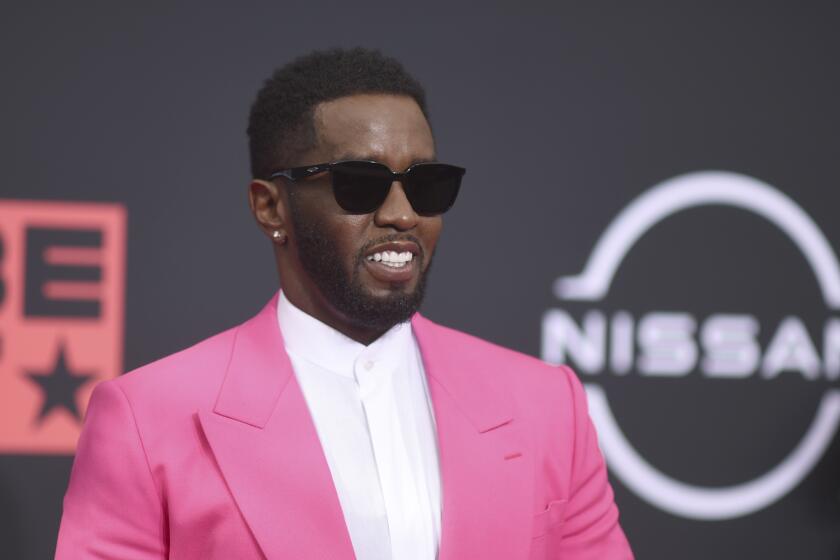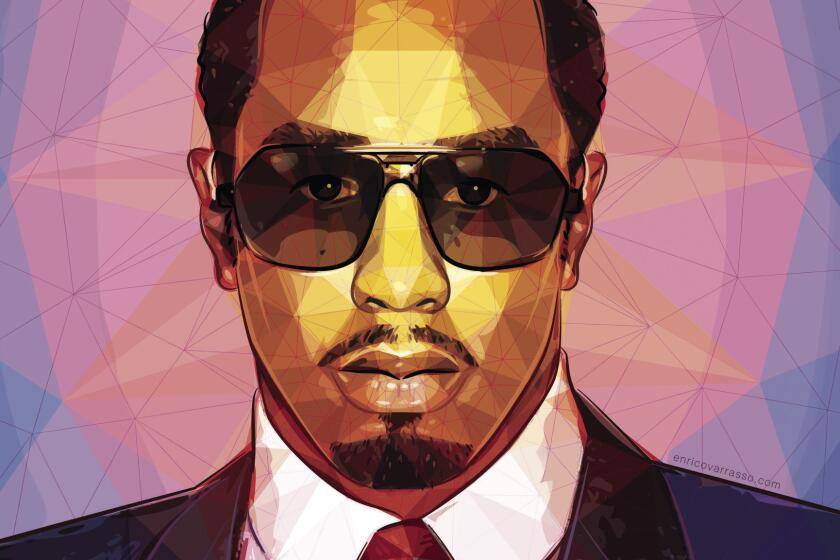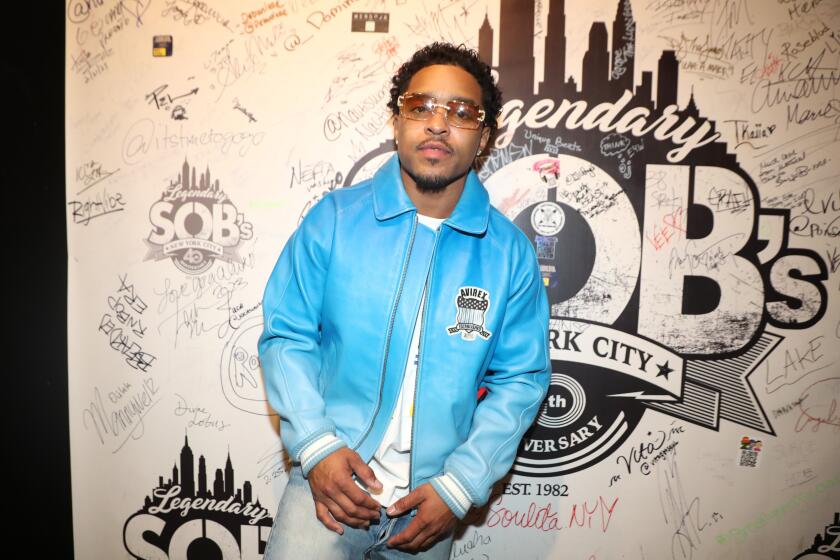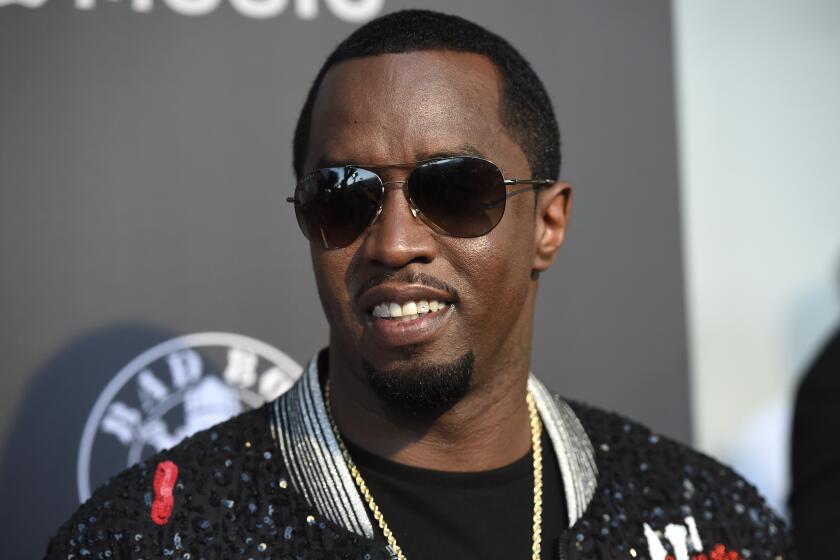Sean ‘Diddy’ Combs accused of rape, ‘cycle of abuse’ by ex Cassie in new lawsuit
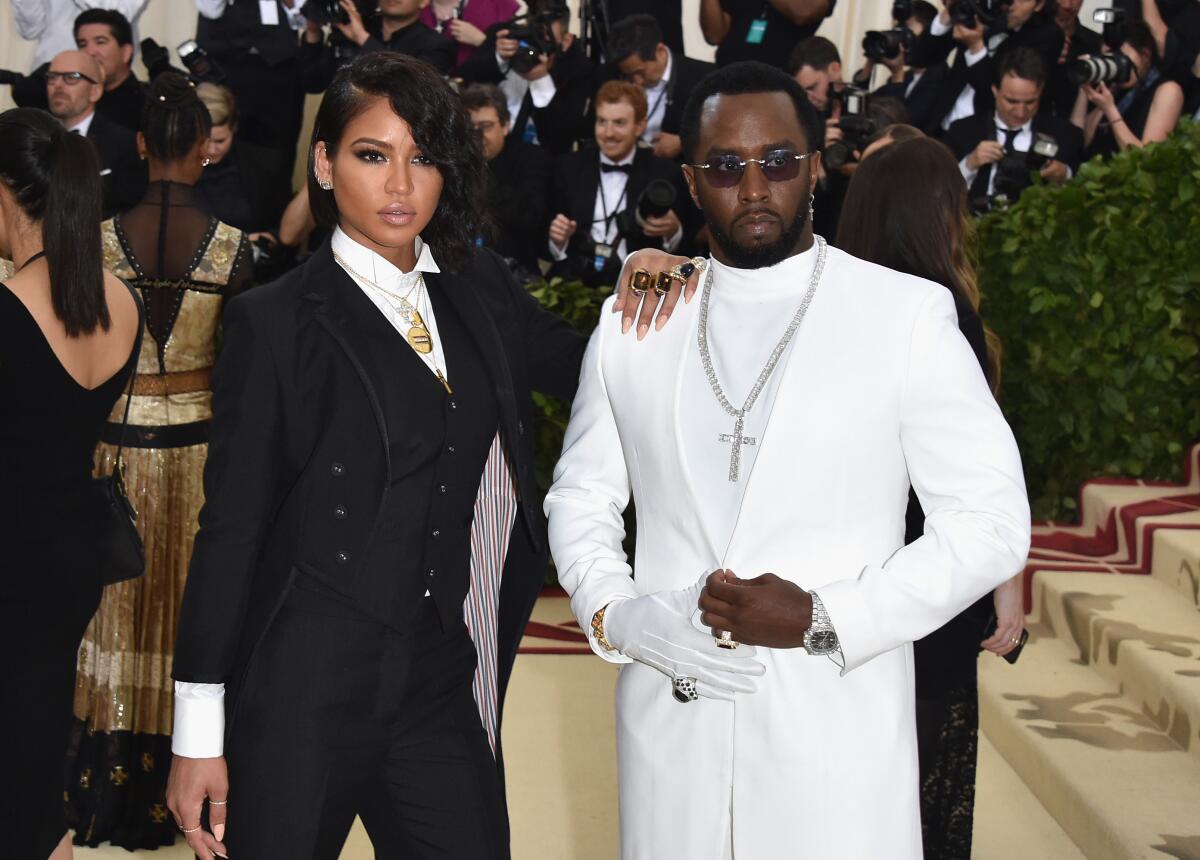
- Share via
This story contains graphic details of physical and sexual abuse.
Music mogul Sean Combs, best known as Diddy, has been accused of rape, sexual assault and sex trafficking by singer and former partner Cassie. Through his attorney, Combs has denied the allegations.
Cassie, who sued under her legal name, Casandra Ventura, dated the famed hip-hop producer for about 11 years before they split in 2018. She filed her sex trafficking and sexual assault lawsuit against Combs on Thursday in U.S. District Court for the Southern District of New York.
Ventura’s lawsuit alleges that she “was held down by Mr. Combs and endured over a decade of his violent behavior and disturbed demands,” referring to that period with him as “dark times” during which she was “trapped by Mr. Combs in a cycle of abuse,” according to a copy of the complaint obtained Thursday by The Times.
The lawsuit — brought under New York’s Adult Survivors Act — comes in the wake of others filed in that state this month against Aerosmith frontman Steven Tyler, music executive Antonio “L.A.” Reid and former Grammys chief Neil Portnow. The Adult Survivors Act created a one-year “lookback window” during which adults who allege they were sexually abused could sue despite the statute of limitations having run out. That window expires next week.
Sean ‘Diddy’ Combs’ liquor company is accusing spirits giant Diageo of ‘longstanding misconduct’ by allegedly starving his DeLeon and Ciroc labels of resources.
In the filing, 37-year-old Ventura accuses Combs, 54, of raping her in her home after she tried to leave him; physically attacking and injuring her; forcing her to engage in sex acts with male sex workers while filming the encounters; running around with a firearm; introducing her to “a lifestyle of excessive alcohol and substance abuse”; and requiring her “to procure illicit prescriptions to satisfy his own addictions.”
“He signed her to his label, Bad Boy Records, and within a few years, lured Ms. Ventura into an ostentatious, fast-paced, and drug-fueled lifestyle, and into a romantic relationship with him — her boss, one of the most powerful men in the entertainment industry, and a vicious, cruel, and controlling man nearly two decades her senior,” the lawsuit said.
Diddy’s lawyer, Ben Brafman, said in a statement to The Times that his client “vehemently denies these offensive and outrageous allegations” and accused Ventura of being “persistent” in demanding more than $30 million from Diddy for the last six months.
He added that the lawsuit is “riddled with baseless and outrageous lies, aiming to tarnish Mr. Combs’ reputation and seeking a payday.”
Long before he was Puff Daddy the hip-hop mogul, Sean John the clothing designer or Diddy the movie star and shameless vodka promoter, Sean John Combs launched a fledgling record label that would change the course of hip-hop in just a week.
According to the lawsuit, Ventura met Combs in 2005, when she was 19 and he was 37. After signing her to his label, the suit alleges, Combs took control of her professional and personal life, and began sexual and physically abusing her with increasing frequency.
Combs introduced Ventura to opiates around 2008, the lawsuit claims, and “would often have pills and other drugs out in the open like candy.” He allegedly demanded eventually that Ventura procure prescriptions from his Miami doctor in her own name rather than taking the mogul’s pills.
Combs also had Ventura’s personal medical records sent directly to his email address, the lawsuit states.
“For instance, when Ms. Ventura began experiencing memory loss — potentially due to excessive drug use and/or head injuries caused by Mr. Combs’s beatings ... her MRI results were provided directly to Mr. Combs,” the suit says. “Mr. Combs also repeatedly arranged for his staff to drive Ms. Ventura to certain doctors’ appointments.”
Steven Tyler of Aerosmith is sued for an alleged 1970s sexual assault in final week allowed by a 2019 state law regarding childhood sexual assaults.
The lawsuit also alleges that, in January 2009, Combs became enraged when he learned that Ventura had spoken with another music manager. The incident allegedly occurred at a party taking place at a club. Combs pulled her out of the club and into a car, the suit states, where he pushed her into a corner and stomped on her face.
“Mr. Combs’s security staff, Roger Bonds, tried to stop the beating, but was unable to deescalate the situation,” the suit says. “When the car arrived at Mr. Combs’ residence, Ms. Ventura attempted to run away, but Mr. Combs followed her and proceeded to again kick her in the face. Ms. Ventura was bleeding profusely, and was ushered into Mr. Combs’ home, where she began to throw up from the violent assault.”
The lawsuit alleges that Ventura was often stashed in hotels while bruises healed, and states that during one such stay at the London Hotel in L.A. she allegedly asked to go home to her parents, but Combs wouldn’t let her leave.
Within a few months of beginning a romantic relationship with Combs, when Ventura was 22, she says she “felt beholden to his whims and demands,” according to the suit. Once when they were staying in New York City, the filing says, Combs told Ventura he had voyeurism fantasies and pressured Ventura to engage in sex acts with male sex workers while he watched. He allegedly provided drugs for those involved in these encounters including ecstasy, cocaine, GHB, ketamine and marijuana and often recorded the activities. Encounters like this were called “freak offs,” according to the suit, and could last multiple days.
Justin Combs, the eldest son of Diddy, was released on bail after being arrested near Beverly Hills on suspicion of misdemeanor DUI on Sunday morning.
According to the suit, it became commonplace for Ventura to get IV fluids in the days after such an encounter to recover from the drug use.
The suit further states that, in 2011, Combs and Ventura had a brief “rough patch” during which Ventura began dating musician Kid Cudi. Combs went through Ventura’s emails and discovered an exchange between her and Cudi. Combs then pummeled her, including with a corkscrew, the lawsuit says. Ventura says she went to her parents’ home in Connecticut, where her mother took photographs of her bruises. In February 2012, during Paris Fashion Week, Combs told Ventura he was going to blow up Cudi’s car, and that he wanted to ensure that the musician was home with his friends when it happened, the suit states: “Around that time, Kid Cudi’s car exploded in his driveway.”
Representatives for Kid Cudi — real name Scott Ramon Seguro Mescudi — did not respond immediately to The Times request for comment. However, regarding the exploded car, he told the New York Times through his publicist, “This is all true.”
“After years in silence and darkness, I am finally ready to tell my story, and to speak up on behalf of myself and for the benefit of other women who face violence and abuse in their relationships,” Ventura said in a statement Thursday. She said that with the Adult Survivors Act window about to close, “it became clear that this was an opportunity to speak up about the trauma I have experienced and that I will be recovering from for the rest of my life.”
In addition to Combs, the lawsuit also names his businesses Bad Boy Entertainment and Bad Boy Records among the defendants, as well as Epic Records and Combs Enterprises LLC.
MTV Video Music Awards takeaways — from Taylor Swift fangirling ‘NSYNC to Olivia Rodrigo’s set collapse and P. Diddy’s family affair.
The producer, label exec and entrepreneur got his start in the ‘90s at Uptown Records, where he worked with R&B acts including Mary J. Blige and Jodeci. At an early event Combs promoted, an AIDS fundraiser at City College of New York, a crowd stampede led to nine deaths. After founding his own Arista Records imprint, Bad Boy Entertainment in 1993, he became a pivotal yet confounding figure in hip-hop — a label owner and producer intent on being just as famous as his stars.
He shepherded acts such as the Notorious B.I.G. and Faith Evans to huge sales and international renown, becoming part of the lore of the era’s bicoastal gangsta-rap feuds. After B.I.G.’s 1997 murder, Combs released his own solo debut, “No Way Out,” a Grammy winner and Billboard No. 1 with singles including “I’ll Be Missing You” (the first rap track to debut atop the Billboard 100) and “It’s All About the Benjamins.”
Although his frequent artist name changes — from Puffy to Puff Daddy to P. Diddy to Diddy and later Love and back to Diddy — became a punchline, Combs expanded well beyond music, launching his successful clothing line Sean John, his reality TV show “Making the Band,” the Revolt cable TV network and high-profile endorsement deals from Ciroc vodka and others.
Diddy alleges Warner Bros. sent him a threatening letter for his Joker costume last Halloween. This year, he dressed as Batman to rail against the big studios.
Violent incidents have shadowed his career. In 1999, Combs was charged with assaulting Interscope Records exec Steve Stoute, and he pleaded guilty to harassment. Later that year, he faced weapons charges after a shooting in a Manhattan nightclub; he was found not guilty. In 2015, he was arrested after attacking his son’s football coach with a kettlebell weight. Prosecutors declined to charge him with a felony in that case.
Diddy’s most recent LP, the September release “The Love Album: Off the Grid,” was nominated last week for a Grammy in the progressive R&B album category. The album features collaborations with a number of lauded female singers and songwriters including H.E.R., Blige, Coco Jones, Summer Walker and Jazmine Sullivan.
“[P]raying for Cassie and her family, for peace and healing. you are beautiful and brave,” singer Dawn Richard tweeted Thursday after the lawsuit news broke. Richard was a member of Danity Kane, a group that formed via Combs’ show “Making the Band.”
Resources for survivors of sexual assault
If you or someone you know is the victim of sexual violence, you can find support using RAINN’s National Sexual Assault Hotline. Call (800) 656-HOPE or visit online.rainn.org to speak with a trained support specialist.
More to Read
The biggest entertainment stories
Get our big stories about Hollywood, film, television, music, arts, culture and more right in your inbox as soon as they publish.
You may occasionally receive promotional content from the Los Angeles Times.
